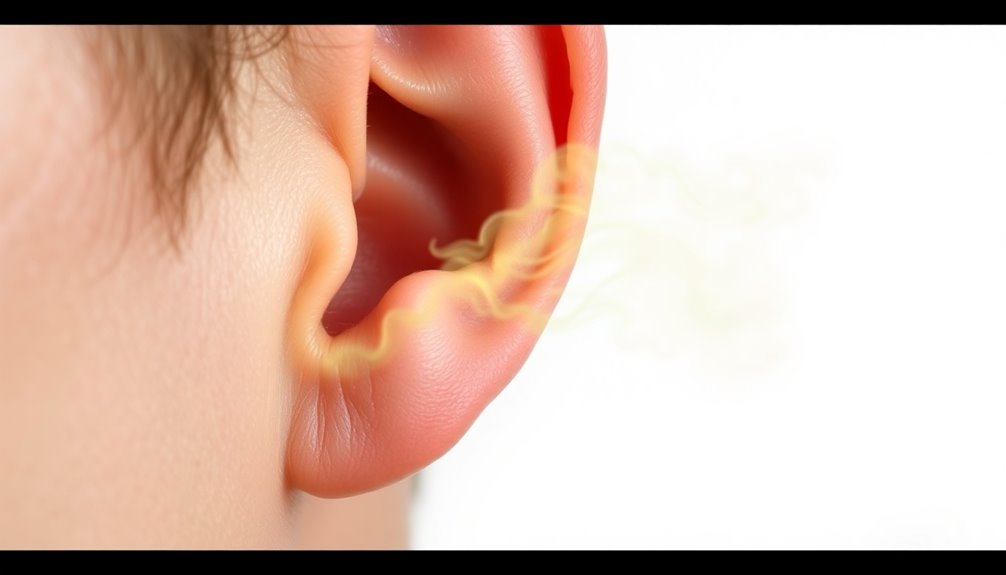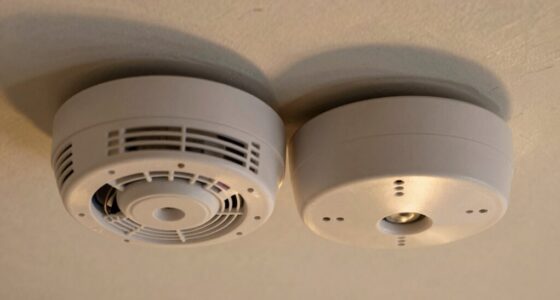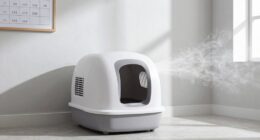If you smell burning rubber in your house, it could point to serious problems you shouldn't ignore. This odor often arises from overheating appliances, malfunctioning HVAC systems, or faulty wiring. Issues like overloaded circuits and frayed cords may also be at play. Immediate action is crucial; check your appliances and electrical systems, and ventilate the area. If the smell persists or you notice other warning signs like flickering lights, it's wise to call a professional. Ignoring these signals can lead to dangerous conditions, and understanding what to look for can help you stay safe. More insights await you!
Key Takeaways
- A burning rubber smell may indicate overheating electrical components or appliances, requiring immediate investigation to prevent fire hazards.
- Check for frayed cords, overloaded circuits, or malfunctioning appliances as potential sources of the burning rubber odor.
- HVAC systems can emit a burning rubber smell due to overheating motors or dust accumulation; regular maintenance is essential for safety.
- If the smell persists or if smoke is present, turn off power to the area and contact a professional for assistance.
- Educate household members on recognizing unusual smells to ensure timely action and enhance overall safety in the home.
Common Causes of Burning Smell
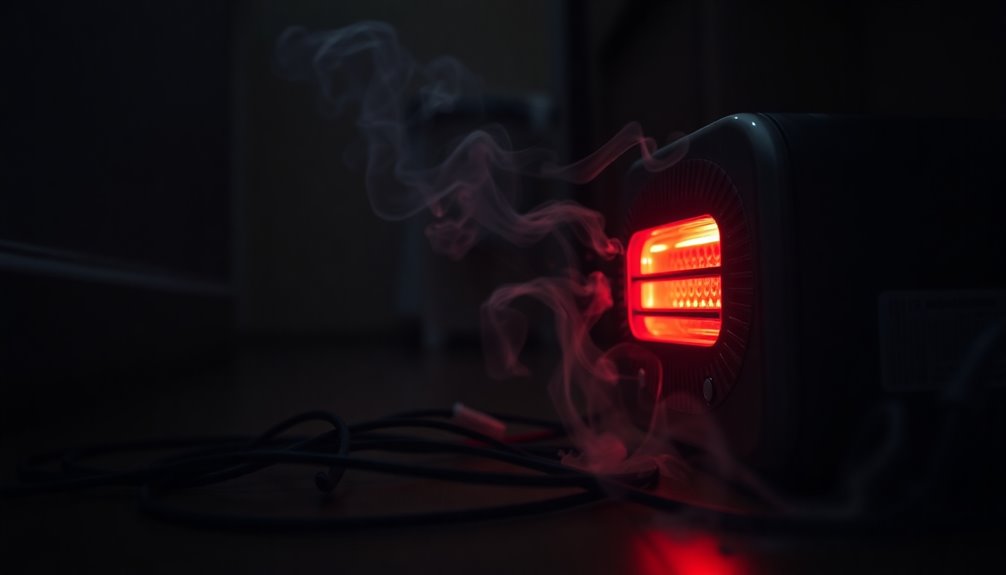
A burning smell in your house can be alarming, and identifying its common causes is crucial for your safety. One major culprit could be electrical issues. Overloaded circuits often lead to overheating, while faulty sockets or switches can create dangerous friction, giving off that unsettling burning odor. If you've noticed this smell coming from your HVAC system, it might be due to electrical malfunctions, especially if it hasn't been cleaned recently.
Additionally, poor ventilation can exacerbate the situation by trapping heat around electrical devices, increasing the risk of overheating and burning smells.
Appliances can also be the source of the stench. Defective appliances with broken fuses or faulty switches are notorious for emitting burning smells. Overheating due to dust buildup or clogs is another common issue. Make sure to regularly clean your appliances and inspect them for faults.
Heating systems are not exempt either; burning dust on components can cause a temporary burning smell when the heater is first activated. Blocked exhaust vents may force combustion exhaust to escape elsewhere, creating an unpleasant odor.
In any case, don't ignore a burning smell. It's often a sign that something's wrong, and immediate attention from a professional might be necessary to prevent potential hazards.
Faulty Wiring Concerns
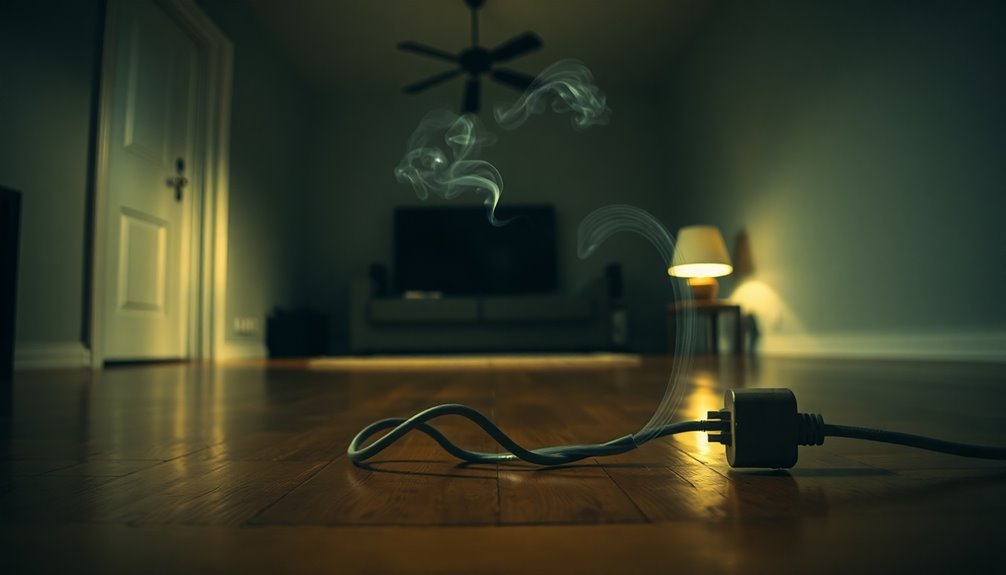
Recognizing the signs of a burning smell in your home can often lead you to faulty wiring concerns. If you notice this odor, it's crucial to act quickly. Overloaded circuits from too many high-amp appliances can cause wiring to overheat, resulting in that burning smell. Look for signs of loose or frayed wires; they can spark and create dangerous friction, heating up the wiring. Excessive moisture can also damage wiring, leading to corrosion and further issues. Additionally, consider implementing a home security system to monitor for unusual activities that may indicate electrical issues. Conducting regular background checks on your property's electrical systems can help identify potential hazards before they escalate. Installing energy-efficient systems, such as commercial grade heat pumps, can also reduce the risk of overheating electronics due to their optimized energy use.
In homes with poor air quality, air purifiers can help reduce the buildup of dust and allergens that might contribute to overheating electronics. Utilizing devices with HEPA filters can significantly improve indoor air quality, thereby reducing risks associated with electrical overheating. Pay attention to tripping circuit breakers, buzzing or discolored outlets, and flickering lights, as these may indicate underlying wiring problems. If you experience any shocking sensations from switches or outlets, it's a clear warning sign. Electrical fires can spread in under 30 seconds, creating dangerous conditions.
Don't ignore frayed or exposed wires; they pose serious fire hazards. If you suspect faulty wiring, shut off the power immediately, unplug appliances, and evacuate if necessary. Call a licensed electrician to inspect and repair the wiring. Regular electrical inspections can help ensure your wiring is safe and up to code, preventing potential hazards from escalating into dangerous situations. Your safety is paramount, so take these concerns seriously.
Overheating Appliances Issues
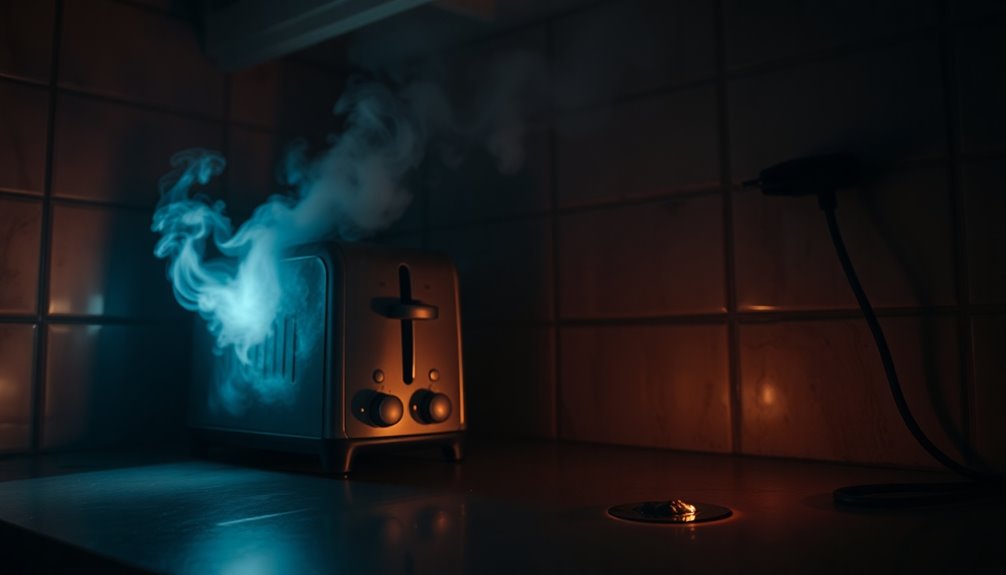
Overheating appliances can pose serious risks in your home, leading to potential fire hazards and costly repairs. You should pay attention to your appliances that emit excessive heat or feel unusually hot to the touch. This could indicate issues with cooling systems or ventilation. Blocked air vents or clogged filters can restrict airflow, causing refrigerators, air conditioners, and HVAC units to overheat. Additionally, using appliances in poorly ventilated areas can exacerbate overheating, highlighting the importance of proper ventilation for appliance safety. Regular filter replacement is essential for maintaining airflow and preventing overheating in air purifiers and HVAC systems. Moreover, being aware of store hours for local grocery chains can help you plan your shopping trips more efficiently. To ensure a safe environment, consider consulting with a financial advisor to discuss potential costs related to appliance repairs or replacements.
Be alert for warning signs like frayed cords, discolored outlets, or appliances that frequently trip the circuit breaker. These issues often stem from overheating due to electrical overloads. If you notice strong, persistent odors or even smoke, take immediate action—these are critical signs of overheating. Additionally, regular checks can help identify potential overheating issues before they escalate. Understanding the health and wellness benefits of a clean home can also motivate you to keep your appliances in good condition.
Common culprits include refrigerators, dishwashers, ovens, and dryers. Malfunctioning motors, faulty sensors, or blocked vents can all lead to overheating. To prevent these issues, perform regular maintenance, ensure proper ventilation, and distribute electrical loads across different circuits. Ignoring these signs can result in severe appliance damage or even fires. Stay vigilant and take the necessary steps to keep your home safe.
Problems With Electrical Fixtures
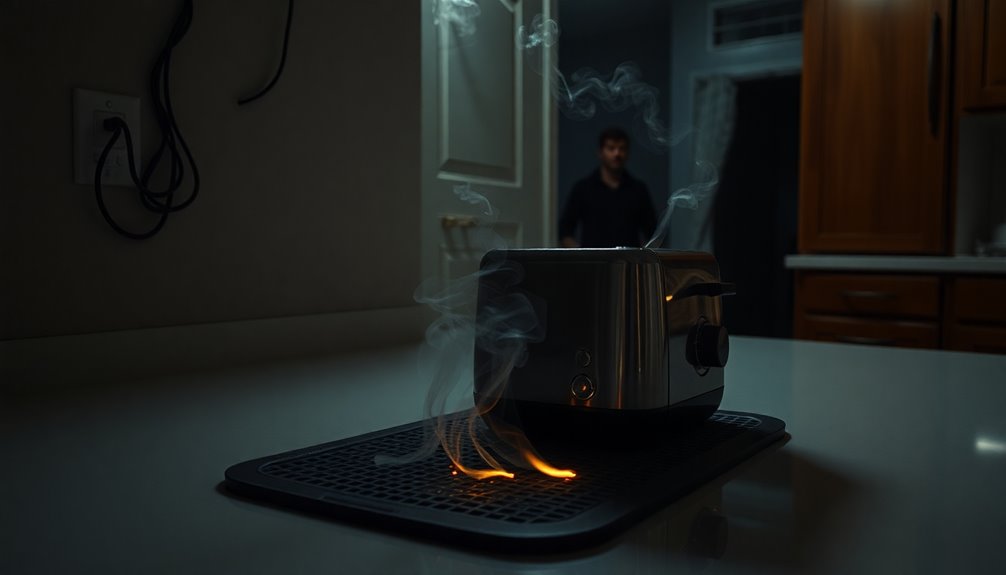
Electrical fixtures can also contribute to the burning rubber smell in your home, often indicating underlying problems that need attention. Loose wiring at switches or outlets can overheat, creating that unpleasant scent. If you notice flickering lights or hear sizzling sounds, it's a sign of worn-out switch contacts, which can also produce burning odors. Faulty sockets or switches may not only cause friction but also lead to short circuits, escalating the risk of fire. Additionally, addressing loose wire connections promptly can prevent further overheating and potential hazards. Regular inspection of stove installation is also important to ensure safe operation of electrical appliances around your wood stove.
Improper bulb usage is another common issue. Using bulbs with the wrong wattage can cause overheating, especially in enclosed fixtures. You should also be cautious about overloaded circuits; too much electrical current can make wires overheat, resulting in burning smells. High voltage and inadequate wiring can worsen this problem, leading to more severe safety hazards.
If you experience burning smells from your electrical fixtures, act quickly. Shut off the power at your circuit breaker and contact a licensed electrician for an inspection. Regular maintenance of your wiring and components can help prevent these dangerous situations. Remember, staying alert to these signs can safeguard your home from potential fire risks.
HVAC System Malfunctions
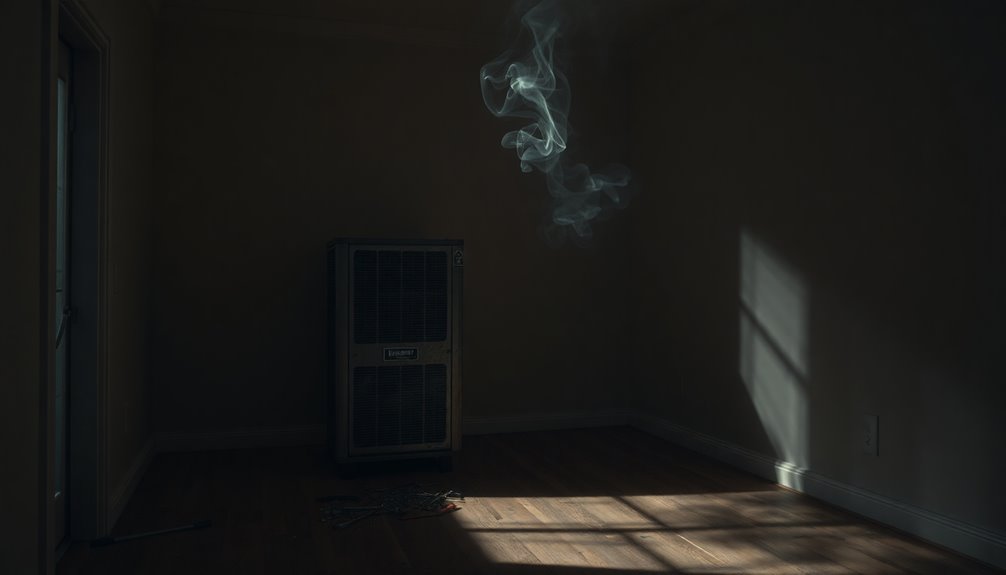
When you notice a burning rubber smell coming from your HVAC system, it's essential to address the issue promptly. This odor can signal several malfunctions, particularly electrical issues. Loose connections or faulty wiring can overheat, releasing that alarming scent. If you suspect electrical problems, turn off the system and call a professional immediately.
Another common culprit is the blower motor. If it's malfunctioning, it may overheat, causing that burning smell. A broken capacitor can also lead to overheating, often producing a distinct plastic odor. Regularly changing your air filter and ensuring the blower area is clear can help prevent these issues. Clogged filters can add additional strain on the blower motor, increasing the risk of overheating.
Refrigerant leaks and dirty coils might also contribute to the problem. Low refrigerant levels can lead to overheating, while dirty condenser or evaporator coils compromise efficiency. Cleaning these components and checking refrigerant levels are vital for proper maintenance.
Lastly, a malfunctioning thermostat can cause your system to run continuously, risking overheating. Regular servicing and annual inspections by an HVAC technician are crucial to prevent these malfunctions and keep your system running smoothly. Don't ignore that burning smell—act quickly to protect your home.
Non-Electrical Sources to Consider
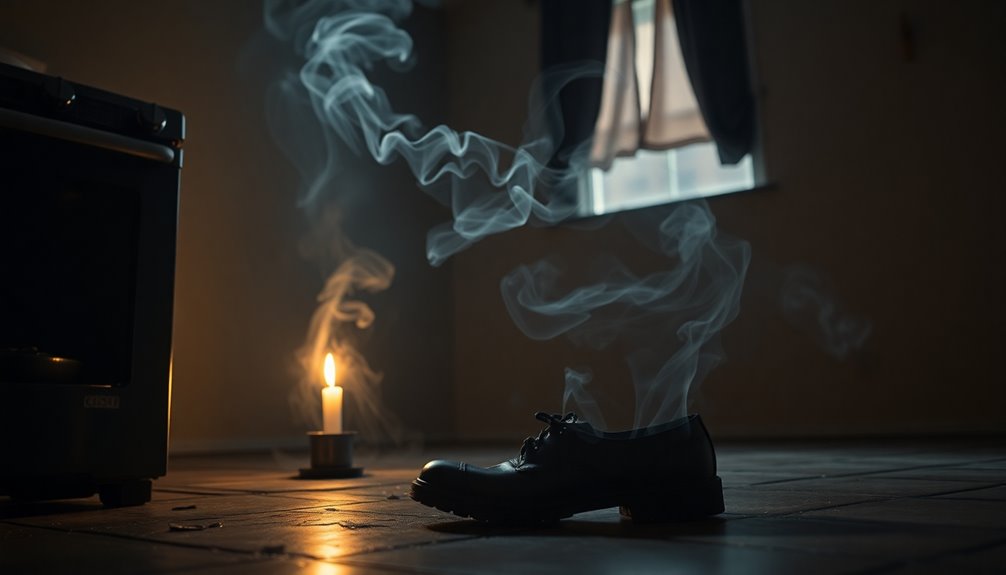
Burning rubber smells in your home can arise from several non-electrical sources that are often overlooked. First, check your belt-driven appliances like washers and dryers. If the belts are disintegrating or the components are overheating, you might notice that unpleasant odor. Even newer appliances can have issues if they're not properly maintained—clogged lint trays or worn-out bearings can lead to problems. Regular servicing of HVAC systems can also prevent odors from circulating through your home, as noise reduction technology in these systems can help identify operational issues before they escalate. Effective preventive maintenance strategies can further reduce the likelihood of these issues. Additionally, fuel injection cleaning can improve the overall performance of your appliances by ensuring they run efficiently.
Next, consider any plastic materials in your kitchen. A plastic utensil left on a hot stove can create a burning smell, as can melting components from overloaded outlets. Additionally, faulty insulation materials can overheat, producing a similar odor. Pet therapy can also enhance emotional well-being by providing companionship, reducing feelings of isolation which may cause anxiety and stress that could lead to increased awareness of odors in the environment. Maintaining good energy efficiency in your home can also contribute to reducing overheating issues in appliances.
Environmental factors also play a role. Excess moisture can damage electrical components, leading to burning smells, while poor air circulation can trap odors in your home. Dust build-up in heating systems and other appliances can cause overheating, too. Lastly, keep in mind that pests might be damaging wiring, or illegal substances could be at play, both leading to burning smells. Regular maintenance and cleaning can help prevent many of these issues, ensuring your home stays safe and odor-free.
Immediate Actions to Take
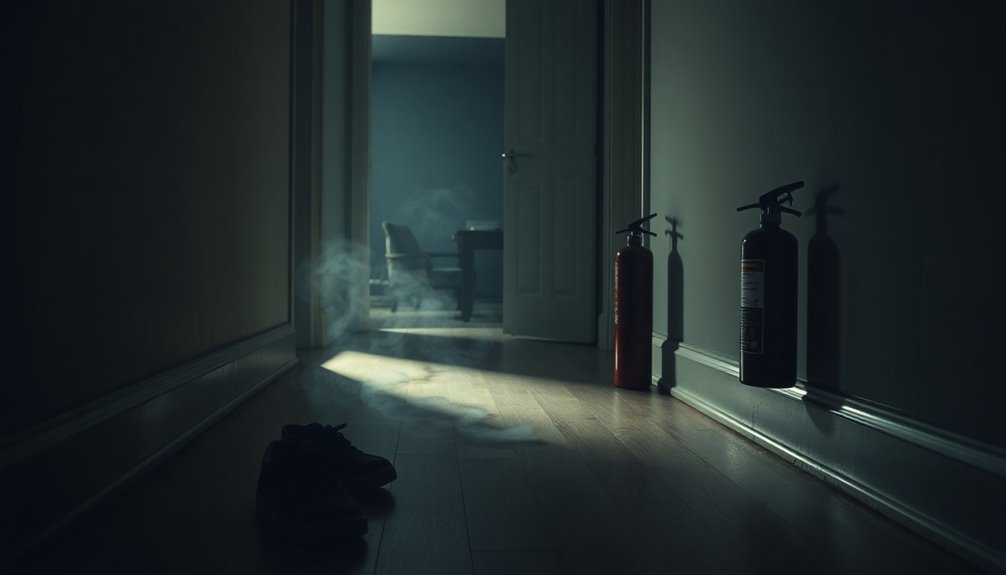
Taking immediate action is crucial when you smell burning rubber in your home. First, use your nose to locate the source of the odor by walking through your house and noting where it's strongest. Check your HVAC system and ductwork, as the smell might be traveling through there. Investigate recently used appliances like the dishwasher, stove, or self-cleaning oven, and examine electrical outlets for overheating signs.
Ventilate the area by opening windows and turning on ceiling fans to disperse harmful fumes. If the smell is overpowering, step outside to avoid inhaling toxic smoke. Avoid attempting any repairs, as this could risk electrical shock or fire. Look for active sparks or signs of damage near the odor's source, and if smoke or fire is present, call 911 immediately.
Next, locate your breaker box and flip the circuit breaker for the offending appliance to the "off" position. If it's safe, unplug the appliance. Shut down any malfunctioning equipment and remove the source from your home if possible. Finally, contact a qualified electrician or HVAC professional to assess and resolve the issue. It's important to note that faulty wiring can lead to overheating and is a common cause of burning smells, so don't ignore this warning sign—it's essential for your safety.
Preventive Measures for Safety
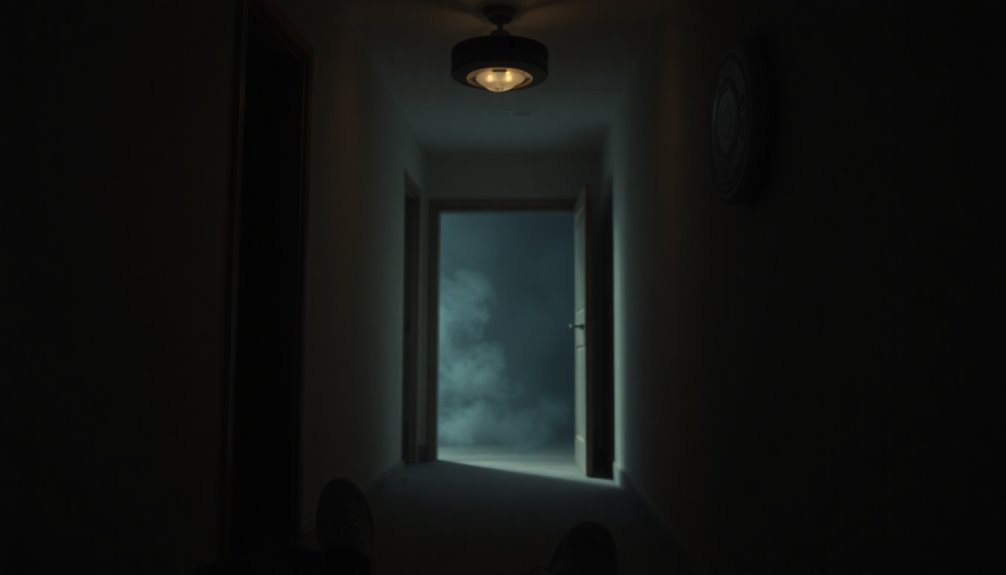
Ensuring your home is safe from electrical hazards requires proactive measures and regular maintenance. Start by inspecting your electrical wiring and outlets regularly for any signs of wear or damage. If you notice frayed wires or malfunctioning outlets, replace them promptly. Always have electrical work done by a qualified electrician to avoid future issues. The presence of security systems can also help prevent potential hazards by deterring criminal activity that could lead to safety violations.
To practice safe electrical habits, avoid overloading circuits by distributing appliances across multiple outlets. Don't use extension cords with major appliances, as they can overheat and pose a fire risk. Unplug small appliances when not in use, and keep lamps and light fixtures away from anything flammable. Always use light bulbs that match the recommended wattage for your fixtures. Recognizing home smells can serve as an early warning system, alerting you to possible electrical issues before they escalate.
Maintain your HVAC system and other appliances by cleaning them regularly to prevent overheating. Replace air filters as needed and ensure your dryer's lint tray is emptied after every use. Use power strips with internal overload protection and install tamper-resistant outlets if you have young children. Finally, conduct regular electrical inspections to catch potential hazards before they escalate, and invest in fire extinguishers designed for electrical fires.
When to Call a Professional
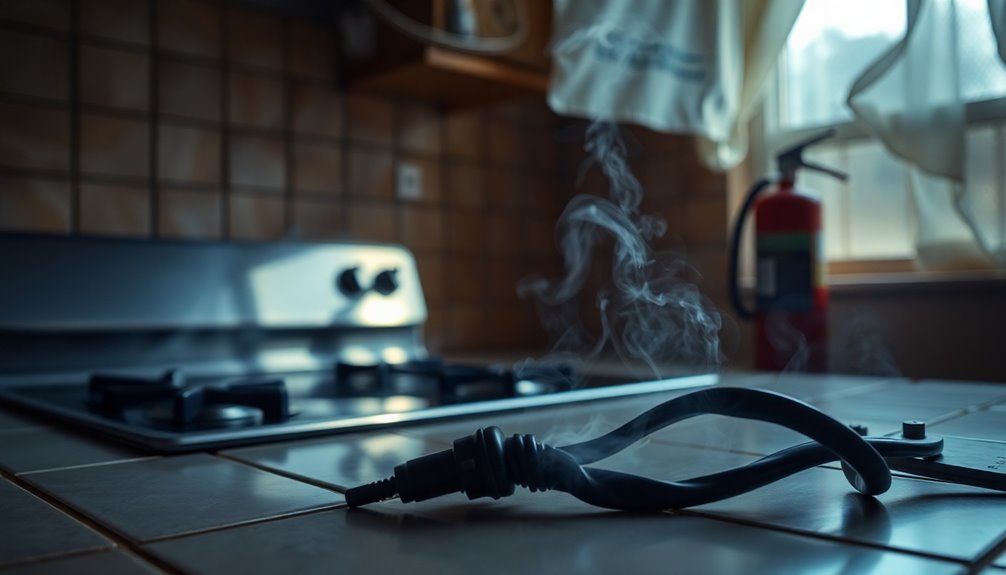
A burning smell in your home can signal serious issues that require immediate attention. If you notice this odor, the first step is to turn off the power to the affected area at the breaker. This action helps prevent further damage or potential fire hazards. Inspect your breaker and fuse boxes for any warmer circuits and look at wall outlets for signs of overheating or melted plastic. Regular preventive measures can help identify electrical issues before they escalate.
If the smell seems to come from your HVAC system or furnace, shut it down immediately. Check for blockages or overheated parts in the ductwork and inspect the chimney for any obstructions. Change any clogged air filters that could be contributing to the problem. Fresh noses are critical in investigations, as crews may become desensitized to odors over time.
Should the smell be linked to an appliance, unplug it right away. Look for clogs or dust buildup that could cause overheating. If you can't determine the source or if the smell persists, it's time to call a professional. Whether an electrician, HVAC technician, or appliance repair specialist, their expertise can help diagnose and resolve the issue safely and effectively. Prioritize your safety—don't hesitate to reach out for help when needed.
Frequently Asked Questions
Can a Burning Rubber Smell Indicate a Fire Hazard?
Yes, a burning rubber smell can definitely indicate a fire hazard. It often signals overheating electrical components or faulty wiring, which can lead to dangerous situations. If you notice this smell, check for visible smoke or fire and act quickly. Unplug devices, shut off power, and call for help if needed. Ignoring these signs could put you and your home at risk, so take immediate action to ensure safety.
How Can I Identify the Source of the Smell?
To identify the source of the burning smell, start by checking appliances and electrical outlets for overheating or damage. Inspect your HVAC system for clogged filters or dust buildup. Don't forget to look at your wiring for any loose or frayed connections. If you can't pinpoint it, consider calling a professional to investigate further. Ignoring it could lead to bigger problems, so it's best to act quickly.
Are There Any Health Risks Associated With Burning Rubber Odors?
Yes, there are significant health risks associated with burning rubber odors. Inhaling these fumes can irritate your throat, lungs, and nose, causing sneezing and breathing difficulties. Long-term exposure may lead to serious issues, including lung damage and even cancer. You should also be aware of toxic components released, like ketones and aldehydes. It's essential to address the source of the smell immediately to protect your health and ensure a safe environment.
What Should I Do if the Smell Goes Away on Its Own?
If the burning rubber smell goes away on its own, don't ignore it. You should still check your electrical appliances and wiring for any signs of damage or overheating. Keep an eye out for unusual behavior from your devices, and consider inspecting your HVAC system and exhaust fans. It's better to be safe than sorry, so if you have concerns, consult a licensed electrician to ensure everything's functioning properly and safely.
Can Pets Be Affected by Burning Rubber Smells?
Yes, your pets can definitely be affected by burning rubber smells. They might experience discomfort or distress, showing signs like excessive drooling or anxious behavior. If you notice these reactions, it's crucial to investigate the source of the smell. It could be related to chemicals in the environment or even health issues like anal gland discharge. Always consult your veterinarian to ensure your pet's well-being and to address any underlying problems.
Conclusion
Don't ignore that burning rubber smell in your house; it could be a serious warning sign. Whether it's faulty wiring, an overheating appliance, or HVAC issues, identifying the source is crucial for your safety. Take immediate actions to investigate and implement preventive measures to avoid future risks. If you're unsure or the smell persists, don't hesitate to call a professional. Your home's safety is worth it, so stay vigilant and proactive!

